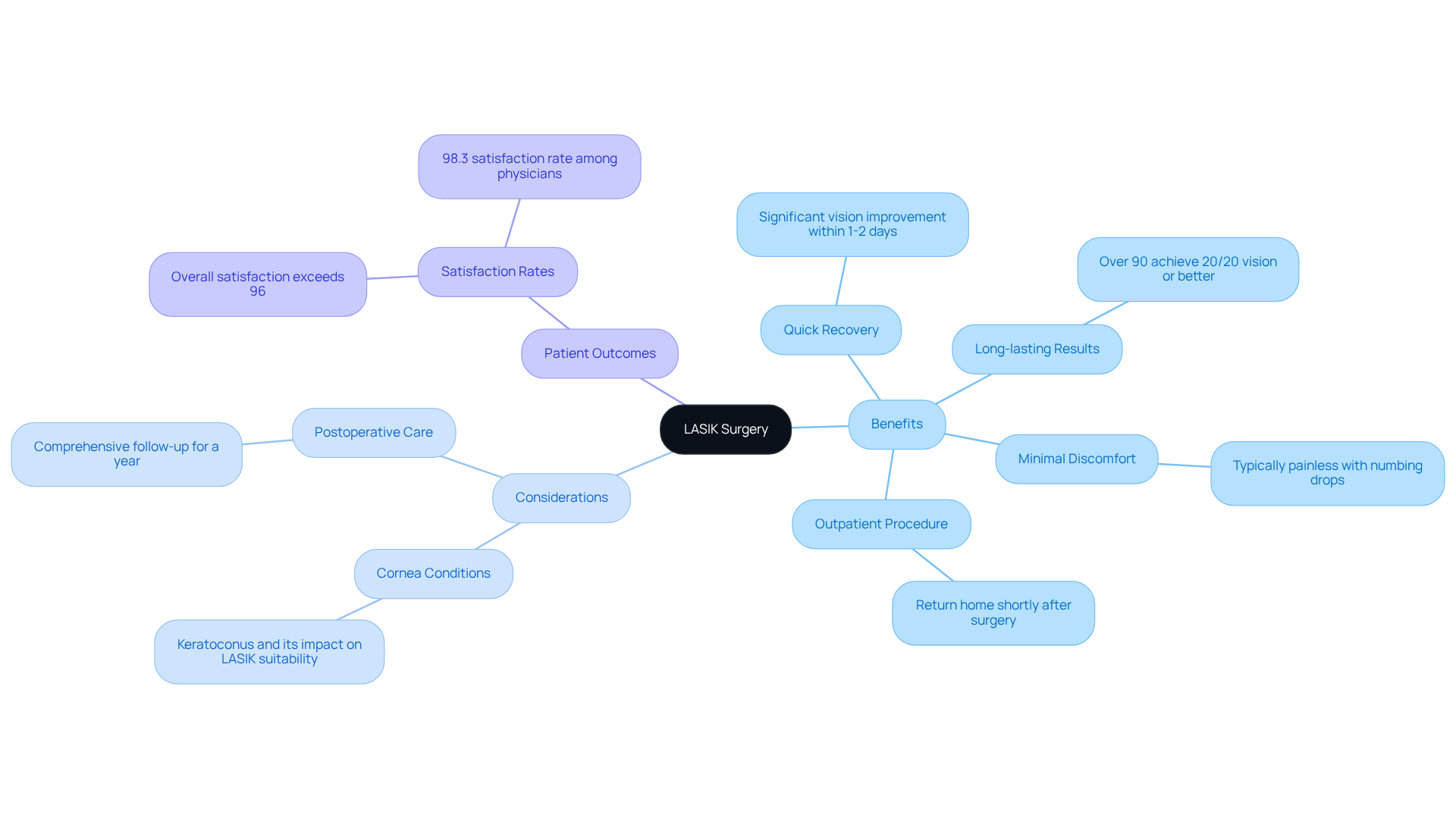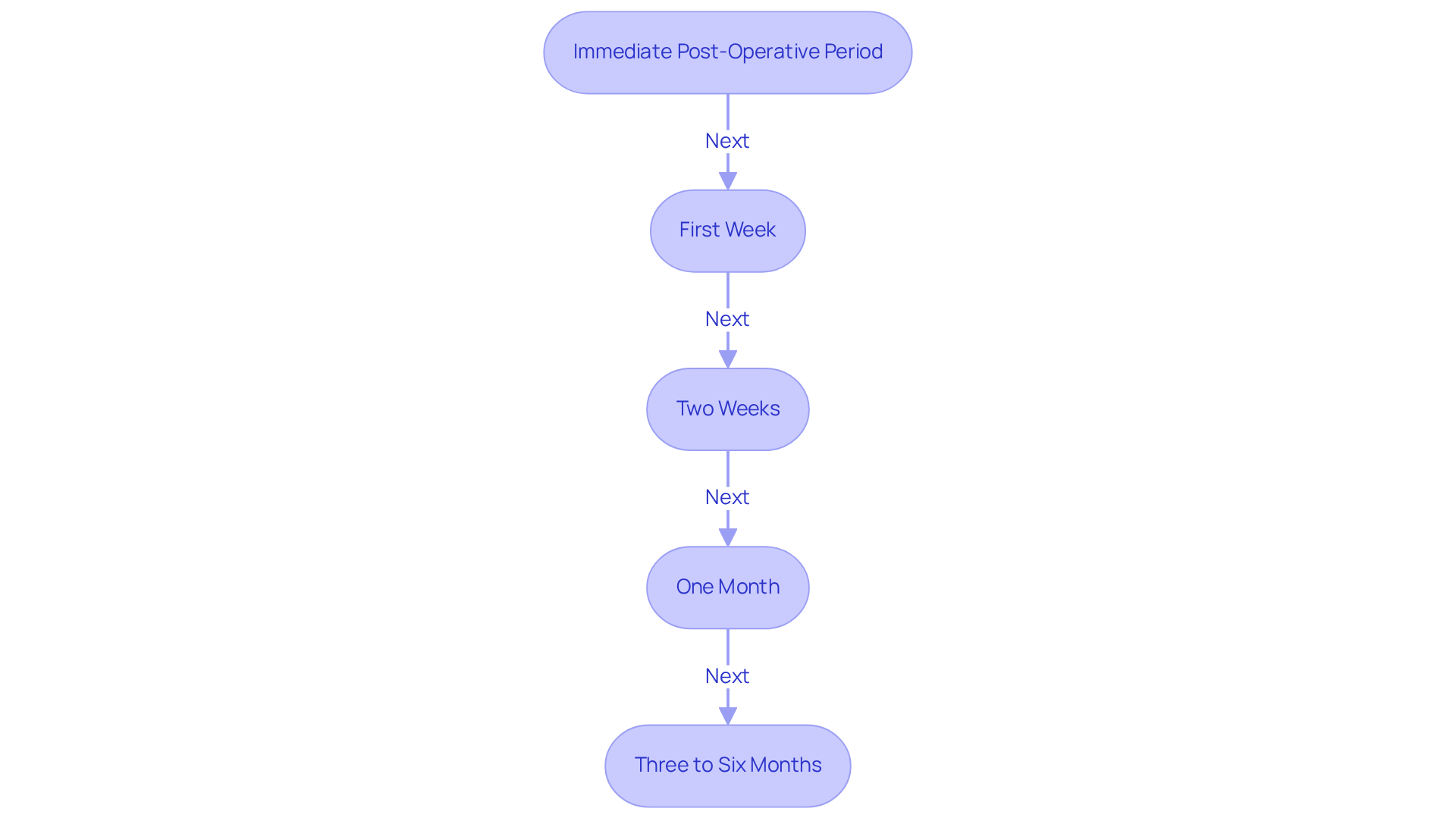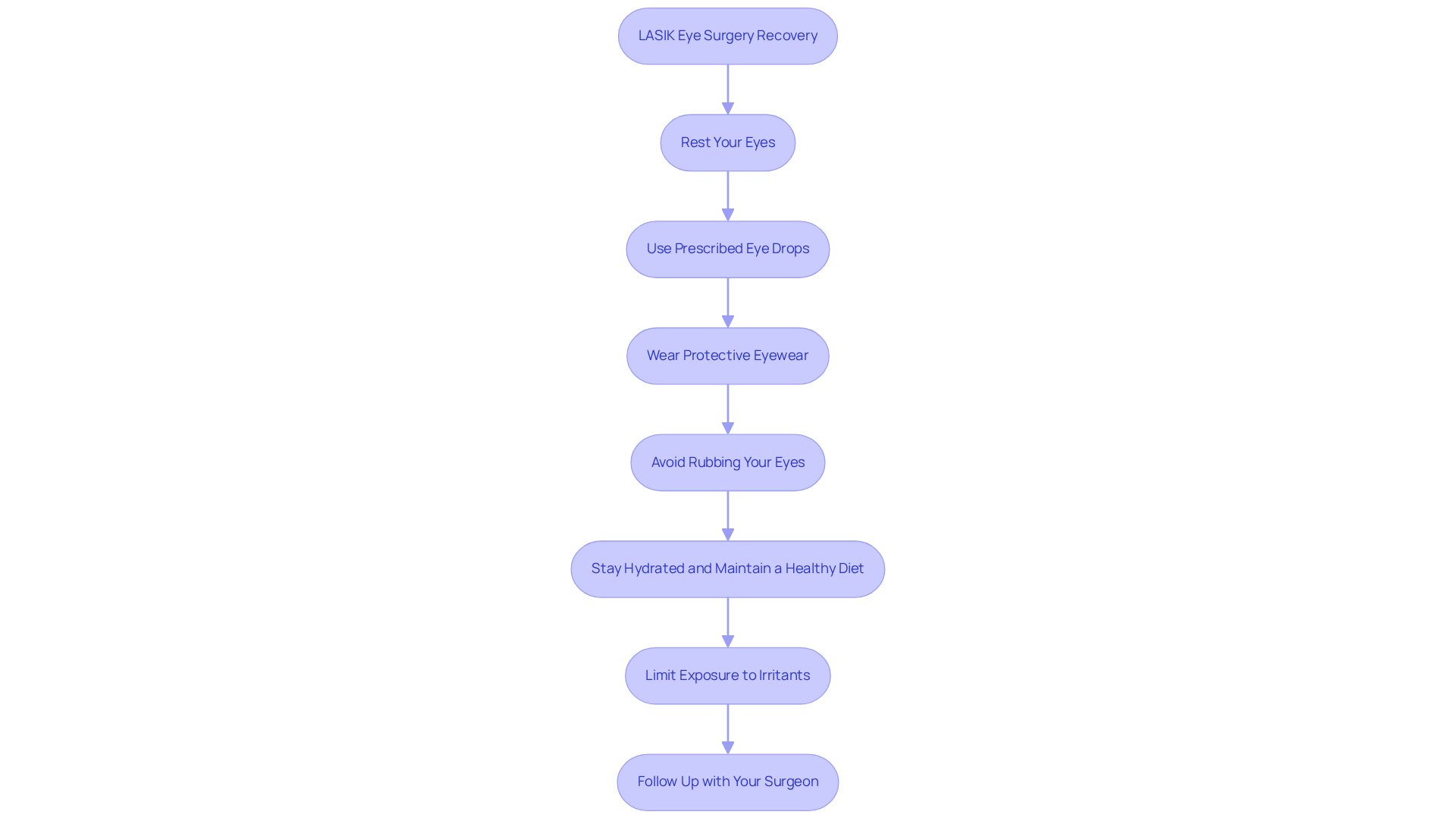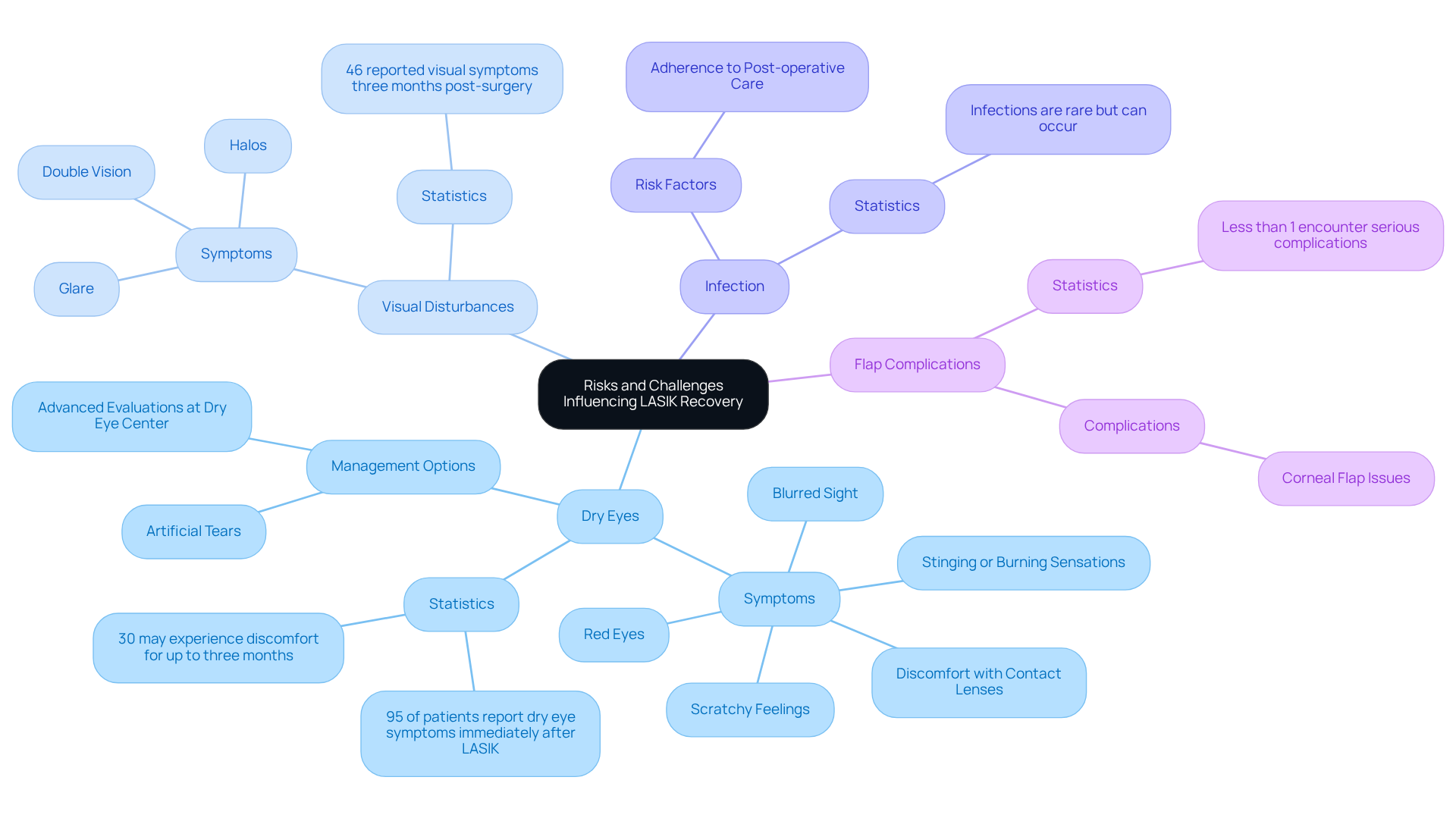Posted by: Northwest Eye in General on September 27, 2025
Overview
We understand that considering LASIK eye surgery can be a significant decision, and it’s natural to have questions about recovery. Typically, patients experience a quick improvement in vision, with many noticing significant enhancements within just one to two days. However, it’s important to remember that full recovery can take up to six months.
This article outlines a detailed recovery timeline, helping you feel more prepared for what to expect. We emphasize the importance of follow-up care and adherence to post-operative instructions, as these steps are crucial for optimal healing and addressing any potential complications. We are here to help you through this process, ensuring you feel supported every step of the way.
Introduction
Understanding the intricacies of LASIK eye surgery can feel overwhelming for many who are considering this life-changing procedure. We recognize the promise of clearer vision and the potential to lessen dependence on corrective eyewear is incredibly appealing. However, it’s important to remember that the recovery journey is just as vital as the surgery itself. This raises an essential question: what can patients genuinely expect during the healing process?
In this guide, we will explore the LASIK recovery timeline in detail. We’ll offer insights into each stage of healing, share effective recovery strategies, and address potential challenges that may arise. Our goal is to ensure that you feel well-prepared and supported on your journey to improved vision.
Understand LASIK Surgery: Key Concepts and Benefits
Laser-Assisted In Situ Keratomileusis, or LASIK, is a well-known refractive eye procedure that aims to address common vision issues such as myopia, hyperopia, and astigmatism. By reshaping the cornea with a laser, LASIK helps light focus more precisely on the retina, leading to improved sight. We understand that considering this procedure can bring about many questions and emotions, so let’s explore the key benefits together:
- Quick Recovery: Most patients notice significant vision improvement within just one to two days post-surgery, allowing them to resume daily activities swiftly.
- Long-lasting Results: A remarkable percentage of individuals achieve 20/25 vision or better, significantly reducing or even eliminating their dependence on glasses or contact lenses.
- Minimal Discomfort: The procedure is typically painless, as numbing drops are applied to ensure comfort throughout the surgery.
- Outpatient Procedure: Conducted on an outpatient basis, this eye surgery allows individuals to return home shortly after the procedure, making it a convenient option for many.
However, it’s essential to understand the condition of your corneas before undergoing the procedure. Conditions like Keratoconus, characterized by a gradual thinning and irregular curvature of the cornea, can affect the suitability for laser eye surgery. Symptoms of Keratoconus may include blurry or double vision and light sensitivity, which could complicate the outcomes of refractive surgery. At Northwest Eye, we may recommend specially fitted contact lenses or procedures like Corneal Collagen Cross-Linking to help manage the condition effectively.
Patient testimonials highlight the transformative effect of laser eye surgery. Many individuals express satisfaction with their newfound clarity of vision, with reports indicating that over 90% of eye surgery recipients achieve 20/20 vision or better. This , as individuals frequently share how the treatment has enhanced their quality of life by freeing them from the constraints of corrective eyewear.
Ophthalmologists also emphasize the benefits of LASIK eye surgery recovery time, noting that patients usually experience fewer instances of dry eye compared to those who rely on contact lenses. Moreover, our commitment to thorough pre-operative assessments ensures that only suitable candidates proceed with the procedure, contributing to the elevated success rates observed in eye surgeries.
Additionally, follow-up care is a vital part of the eye surgery process. Patients at Northwest Eye receive comprehensive postoperative care, including follow-up appointments for a full year, ensuring you feel supported throughout your LASIK eye surgery recovery time. Overall, understanding these aspects is crucial as you prepare for your eye surgery journey, ensuring you are well-informed about the LASIK eye surgery recovery time and ready for the recovery process ahead.

Explore the LASIK Recovery Timeline: Stages and Expectations
The recovery timeline after LASIK surgery can be segmented into several key stages, each with distinct expectations that we understand can be concerning:
- Immediate Post-Operative Period (First 24 Hours): Following the procedure, it’s common to experience blurry sight, light sensitivity, and mild discomfort. We encourage you to rest and avoid screens during this initial phase to support your healing process.
- First Week: Many patients notice a considerable enhancement in their sight within the first few days. However, fluctuations in vision and mild side effects, such as dryness or irritation, may persist. Most individuals achieve normal or better vision within three days post-surgery, which can be a reassuring milestone.
- Two Weeks: By this stage, most individuals can resume normal activities, including work. Regular follow-up appointments with your surgeon are essential to monitor your healing and address any concerns you might have.
- One Month: Vision stabilization generally occurs for the majority of individuals, although some may still encounter minor fluctuations. It’s important to remain vigilant and report any unusual symptoms to your ophthalmologist, as this can help ensure your comfort and peace of mind.
- Three to Six Months: Full recovery can take up to six months, during which your vision may continue to improve. We recommend maintaining to ensure optimal healing and to address any potential issues that may arise.
Understanding the LASIK eye surgery recovery time equips you with the knowledge to navigate your recovery effectively, ensuring you are prepared for each stage of the healing process. Remember, we are here to help you through this journey.

Implement Effective Recovery Strategies: Tips for a Smooth Healing Process
To ensure a smooth recovery after , we understand that you may have concerns regarding the process. Here are some strategies to help you on your journey:
- Rest Your Eyes: Prioritize rest immediately after surgery. It’s common to feel the urge to check your devices, but we recommend avoiding screens and reading for the first 24 hours to reduce strain on your vision.
- Use Prescribed Eye Drops: Following your surgeon’s instructions regarding eye drops is crucial. This helps prevent dryness and promotes healing. Remember, 95% of LASIK patients experience dry eye symptoms post-surgery, but rest assured, these symptoms typically improve within a few days to months.
- Wear Protective Eyewear: Utilizing sunglasses outdoors and protective shields during sleep is essential. This helps avoid unintentional rubbing of your eyes, which is particularly important in the first week after surgery.
- Avoid Rubbing Your Eyes: We understand that it can be tempting, but it’s vital to refrain from rubbing your eyes to prevent complications during the initial recovery phase.
- Stay Hydrated and Maintain a Healthy Diet: Proper hydration and nutrition support your overall healing. Staying well-hydrated can significantly impact your eye recovery, as adequate moisture is vital for healing tissues.
- Limit Exposure to Irritants: Avoiding smoky or dusty environments is advisable, as these can cause discomfort and hinder your recovery.
- Follow Up with Your Surgeon: Attending all scheduled follow-up appointments is key. This ensures your eyes are healing properly and allows you to address any concerns. Most individuals attain normal or improved vision within three days following the procedure, highlighting the importance of continuous care for the best results.
By applying these strategies, you can promote a smoother recovery during the LASIK eye surgery recovery time and improve the overall success of your eye surgery. We are here to help you through this process.

Identify Risks and Challenges: Factors Influencing Your Recovery
While LASIK is generally regarded as a safe procedure, we understand that several risks and challenges can influence your lasik eye surgery recovery time.
- Dry Eyes: It’s common to experience dry eye symptoms after LASIK, with approximately 95% of patients reporting these sensations immediately following the procedure. About 30% may continue to feel discomfort for up to three months. Symptoms can include stinging or burning sensations, scratchy feelings, blurred sight, red eyes, and discomfort when wearing contact lenses. While temporary dry eye discomfort is typical and can last for several weeks, using and other treatments can help alleviate this discomfort. At Northwest Eye, our Dry Eye and Blepharitis Center offers a thorough evaluation to assess the volume and quality of your tears, utilizing advanced tests such as LipiView® and Tear Osmolarity. These evaluations help us tailor treatment options to effectively manage your post-operative dry eye symptoms.
- Visual Disturbances: Many patients may encounter glare, halos, or double vision, particularly in low-light conditions. Research suggests that up to 46% of participants in the eye procedure reported visual symptoms three months after surgery. However, it’s reassuring to know that these symptoms frequently improve with time.
- Infection: Although rare, infections can occur following laser eye surgery. Adhering to post-operative care instructions is crucial to minimize this risk and ensure proper healing during the lasik eye surgery recovery time.
- Flap Complications: Complications related to the corneal flap created during surgery can arise. Regular follow-ups are necessary to detect and address any issues early. Fewer than 1% of LASIK recipients encounter serious complications, but vigilance is essential.
Age and health factors can influence lasik eye surgery recovery time; if you are elderly or have certain health conditions, you may experience a longer recovery period or a heightened risk of complications. Pre-existing dry eye conditions are particularly notable risk factors for developing post-LASIK dry eyes.
Understanding these risks enables you to take necessary precautions and maintain open communication with your healthcare provider. We are here to help you through this process, ultimately ensuring a safer and more effective recovery.

Conclusion
Understanding the journey of LASIK eye surgery recovery is essential for anyone considering this transformative procedure. We know that the prospect of recovery can bring about a mix of emotions, and this article aims to illuminate the key aspects of what to expect during this process. By emphasizing the swift improvement in vision and the importance of following post-operative care guidelines, we hope to instill confidence and clarity in your LASIK experience.
The discussion highlights the remarkable benefits of LASIK, including quick recovery times, minimal discomfort, and long-lasting results. However, it’s also important to address potential risks such as dry eyes and visual disturbances. Each recovery stage, from the immediate post-operative period to the full recovery timeline, is detailed to provide a comprehensive understanding of the healing process. Moreover, effective strategies for a smooth recovery—such as rest, hydration, and adherence to follow-up appointments—are outlined to ensure you feel well-equipped for your journey.
Ultimately, the significance of being informed about LASIK eye surgery recovery cannot be overstated. We understand that engaging in the recovery process and maintaining open communication with your healthcare providers can enhance your healing experience and lead to optimal vision outcomes. Embracing this knowledge not only empowers you but also paves the way for a transformative journey towards clearer sight and improved quality of life. Remember, we are here to help you through this process, ensuring you feel supported every step of the way.
Frequently Asked Questions
What is LASIK surgery?
LASIK (Laser-Assisted In Situ Keratomileusis) is a refractive eye procedure designed to correct common vision issues such as myopia, hyperopia, and astigmatism by reshaping the cornea with a laser to improve light focus on the retina.
What are the key benefits of LASIK surgery?
Key benefits include quick recovery with significant vision improvement within one to two days, long-lasting results with many achieving 20/25 vision or better, minimal discomfort during the procedure, and it being an outpatient procedure allowing patients to return home shortly after.
How quickly do patients recover from LASIK surgery?
Most patients notice significant vision improvement within one to two days after the surgery, enabling them to resume their daily activities swiftly.
Is LASIK surgery painful?
The procedure is typically painless as numbing drops are applied to ensure comfort throughout the surgery.
Are there conditions that affect LASIK surgery suitability?
Yes, conditions like Keratoconus, which involves thinning and irregular curvature of the cornea, can affect suitability for LASIK. Symptoms may include blurry or double vision and light sensitivity.
What alternatives are available for those with Keratoconus?
For individuals with Keratoconus, specially fitted contact lenses or procedures like Corneal Collagen Cross-Linking may be recommended to manage the condition effectively.
What is the satisfaction rate of LASIK surgery?
Over 90% of eye surgery recipients achieve 20/20 vision or better, indicating a high satisfaction rate and transformative effects on their quality of life.
How does LASIK surgery compare to contact lenses regarding dry eye?
Patients who undergo LASIK surgery typically experience fewer instances of dry eye compared to those who rely on contact lenses.
What kind of follow-up care is provided after LASIK surgery?
Patients receive comprehensive postoperative care, including follow-up appointments for a full year to ensure support throughout the recovery process.
Why is understanding LASIK important before the procedure?
Understanding the procedure, recovery time, and potential conditions affecting suitability is crucial for being well-informed and prepared for the LASIK eye surgery journey.






